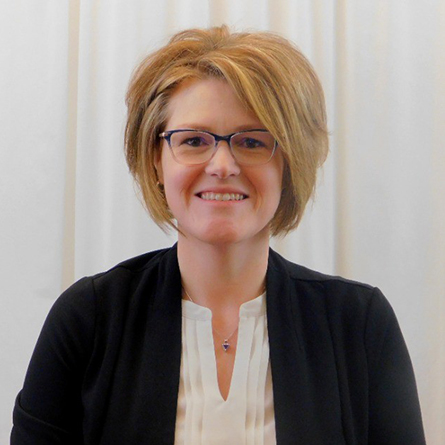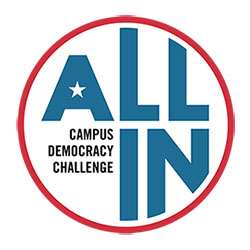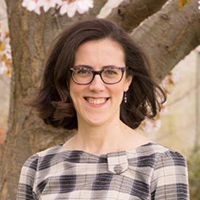
All In for the November Election

Conventional wisdom holds that young voters won’t turn out on Election Day. Conn students are determined to prove the political prognosticators wrong.
Connecticut College President Katherine Bergeron has joined with more than 160 college and university leaders from across the country in signing the ALL IN Campus Democracy Challenge—an effort to encourage full participation in the 2020 elections by all eligible students.
“The All In Campus Democracy Challenge is an extension of Connecticut College’s mission: to educate students to put the liberal arts into action as citizens in a global society,” Bergeron said. “Voting is a precious right, foundational to citizenship, and the most direct way to discharge your civic duty.”
The nonpartisan initiative, sponsored by Civic Nation, a nonprofit that works to increase civic engagement and political participation among college students in federal, state and local elections, calls for a slew of tangible measures aimed at improving turnout among student voters, including designating a staff to lead the effort on campus, helping to educate student voters on the political process and creating a democratic action plan that prioritizes direct involvement in the electoral process both in the classroom and through co-curricular learning.
The initiative, spearheaded by Conn’s Holleran Center for Community Action, continues to build on the College’s tradition of political participation.
“I think now more than ever it is important to encourage young people to be engaged in our political system because they have the ability to shake up politics, whether that be through voting or other civic and political engagement initiatives,” said Angela Barney, who serves as assistant director of Program in Community Action at the Holleran Center and is leading the All In at Conn challenge.
For the past two years, the Holleran Center has been involved in NESCAC Votes, a group of Conn’s peer institutions that support ALL IN Democracy on their respective campuses. Barney has served as Conn’s representative and currently co-leads the initiative with her counterparts at Bowdoin and Middlebury Colleges, attending monthly calls, participating with students in the NESCAC Votes conference and coordinating voter registration efforts on campus.
This semester, Barney will also be teaching a First-Year Seminar titled, “Beyond the Ballot: Applied Civic & Political Engagement,” an interdisciplinary course that will explore forms of mass political engagement in the United States including voting, community engagement and social change.
“We hope that this course will empower students to envision their own identities as active, engaged, responsible agents of change,” Barney said.
The students have played an essential role. Throughout the summer, Barney worked with Jozette Moses ’21 and Julia O'Connell ’21 on projects to help raise awareness and promote the initiative, including establishing the Instagram account @camelsvote to provide daily updates and educational information on voting rights and processes, and a new website, camelsvote.org, that offers full details on the initiative, resources to register and vote, sources to support informed voting and a list of events to further student participation in the upcoming election.
The hard work has garnered substantial attention. Moses and O'Connell were recently featured on The Youth Vote podcast, and Conn has also partnered with Every Vote Counts and Power the Polls—two organizations focused on expanding voter participation and access.
“It’s been incredibly rewarding to see the Conn community engage with the information and resources we’re providing through Camels Vote and the Instagram account, from detailing how to receive an absentee ballot to finding individual polling stations and more,” said O’Connell, a sociology major and Program in Community Action scholar.
“One of our central goals has been to reimagine Camels Vote programming in light of the pandemic so we can ensure the Conn community is in a strong position to engage in the final months leading up to the election.”
Moses, an English and French double major, agreed that the COVID-19 outbreak injected an even greater sense of urgency into their work, and said she was encouraged by the positive response they’ve received so far from fellow students.
“One of my favorite aspects of working with Camels Vote is receiving messages from other young voters, students and friends asking questions about vote-by-mail ballots or inquiring about state voting laws,” Moses said.
“When we receive inquiries like this, we know there are students who are motivated to support our democracy and who care about the leaders being put in positions of power, and as get closer to Election Day, we encourage students to vote-by-mail as it is a safe and practical way to carry out our vote,” she said.
